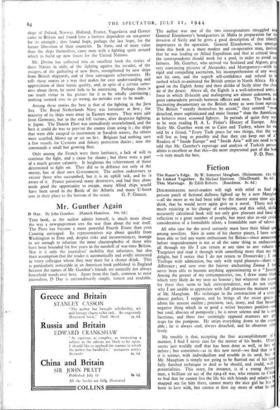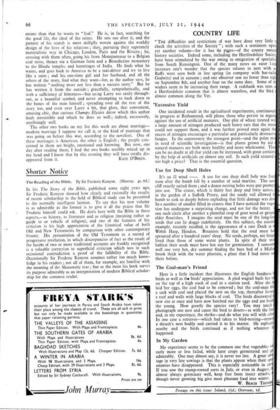Fiction
DISCRIMINATING novel-readers will sigh with relief to find present patch of fictional dullness lighted up by a new Maugh —all the more as we had been told by the-master some time ago, think, that he would never again give us a novel. There will much rejoicing at his change of resolution, and this solid, skill accurately calculated book will not only give pleasure and food reflection to a great number of people, but must also re-stir criti consideration of a formidable talent, a formidable sum of talent, All who care for the novel seriously must have their blind s among novelists. Sive in some of his shorter pieces, I have net been able to feel any warm enthusiasm for Balzac—since amazem before stupendousness is not at all the same thing as enthusiasm all through my life I can return at any time to any volume "Turgeniev and read it through with something more than my delight, but I notice that I do not return to Dostoevsky ; I r Trollope with admiration, but only with tepid pleasure—there is difference ; and save over the forever enchanting Emma I ha never been able to become anything approximating to a " Jane Among the greater of my contemporaries, too, I draw some bla which very likely do my taste no honour ; but whatever the rea for these they seem to lack correspondence, and do not elm! why I am unable to appreciate with full pleasure the maturer of Mr. Maugham. His technique in the construction of a story almost perfect, I suppose, and he brings all the easier graces. adorn his austere outline ; precision, tact, irony, and that beam negative thing which in so -good a writer becomes positive—t but total, absence of pomposity ; he is never solemn and he is n facetious, and these two seemingly opposed manners are g traps for the pompous. He strips everything down to the rea able ; he is always cool, always detached, and he observes eel lessly.
My trouble is that, accepting the fine accomplishment of manner, I find I never care for the matter of his books. Often seems just worldly stuff that has been done as well, or less before ; but sometimes—as in this new novel—we find that in it is serious, with individualism and trouble .in its seed, but Mr. Maugham is simply not going to be flurried out of his ben fully finished technique to deal as he should, and could, with potentialities. This story, for instance, is. of a young Am man, a brilliant air ace of the 1914-18 war, who returns to Chi to find that he cannot live the life his rich friends and relatives mapped out for him there, cannot marry the nice girl he has been in love with, but cannot at first say more of what be
means than that he wants to " loaf." He is, in fact, searching for the good life, the ideal of the saints. He sets out after it, and the pattern of his search is most skilfiely woven against the worldly design of the lives of his relations ; they, pursuing their supremely materialistic way in Chicago, London, Paris and the Riviera ; he, crossing with them often, going his from Montparnasse to a Belgian coal mine, thence via a German farm and a Benedictine monastery to the Hindu temples and hermitages of India. He finds what he wants, and goes back to America to be a taxi-driver and try to live like a saint ; and his one-time girl and her husband, and all the others of the story, find what they want—for, as the author says, he has written " nothing more nor less than a success story." But he has written it from the outside ; gracefully, sympathetically, and with a sufficiency of bitterness—but using Larry too easily through- out, as a beautiful symbol, and never attempting to hack down to the bones of the man himself ; spreading over all the rest of the story too, and even over Larry a bit, that gloss, that convenient, amusing chic, that curious Champs Elysies decor which this author finds irresistible and which he does so well ; indeed, excessively, sterilisingly well. The other two books on my list this week are about marriage— modern marriage I suppose we call it, or the kind of marriage that was going on before this war, according to the novelists. One of these marriages is American, the other is English ; the people con- cerned in them are bright, emotional and knowing. But now, one day after reading them, I find the two books terribly mixed up in my head and I know that by this evening they will have totally dis-























 Previous page
Previous page